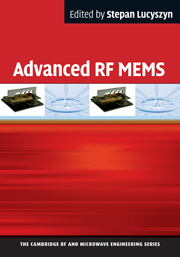Book contents
- Frontmatter
- Dedication
- Contents
- List of Contributors
- Preface
- List of Abbreviations
- 1 Introduction
- 2 Electromechanical modelling of electrostatic actuators
- 3 Switches and their fabrication technologies
- 4 Niche switch technologies
- 5 Reliability
- 6 Dielectric charging
- 7 Stress and thermal characterisation
- 8 High-power handling
- 9 Packaging
- 10 Impedance tuners and tuneable filters
- 11 Phase shifters and tuneable delay lines
- 12 Reconfigurable architectures
- 13 Industry roadmap for RF MEMS
- Author biographies
- Index
- References
6 - Dielectric charging
Published online by Cambridge University Press: 05 February 2014
- Frontmatter
- Dedication
- Contents
- List of Contributors
- Preface
- List of Abbreviations
- 1 Introduction
- 2 Electromechanical modelling of electrostatic actuators
- 3 Switches and their fabrication technologies
- 4 Niche switch technologies
- 5 Reliability
- 6 Dielectric charging
- 7 Stress and thermal characterisation
- 8 High-power handling
- 9 Packaging
- 10 Impedance tuners and tuneable filters
- 11 Phase shifters and tuneable delay lines
- 12 Reconfigurable architectures
- 13 Industry roadmap for RF MEMS
- Author biographies
- Index
- References
Summary
Introduction
The reliability of RF MEMS switches constitutes a key issue for their commercial success and, thus, warrants an intense research effort. In the case of capacitive switches, the reliability is practically limited by dielectric charging. More precisely, it comes from the fact that when a capacitive RF MEMS switch is in the down position, i.e. touching the dielectric, there is a high electrical field across this dielectric. This can cause charging of the dielectric, which further results in a change in the pull-in voltage Vpi and may severely limit the functionality of the device (e.g. cause stiction).
Currently, many capacitive switches have been tested in excess of 108 cycles, operating with various voltage waveforms and with acceptable degradation. To increase the device lifetime, several excitation waveforms have been investigated; such as bipolar, two-step unipolar, etc. All these efforts, although prolonging lifetime, have not contributed significantly to our understanding of dielectric charging. The aim of this chapter is to present existing knowledge for lifetime improvement and an understanding of dielectric charging, as well as to analyze the charging processes and injection mechanisms within dielectrics. Finally, having these in mind, this chapter will attempt to examine the issue of dielectric charging from a different perspective.
Information
- Type
- Chapter
- Information
- Advanced RF MEMS , pp. 140 - 187Publisher: Cambridge University PressPrint publication year: 2010
References
Accessibility standard: Unknown
Why this information is here
This section outlines the accessibility features of this content - including support for screen readers, full keyboard navigation and high-contrast display options. This may not be relevant for you.Accessibility Information
- 6
- Cited by
